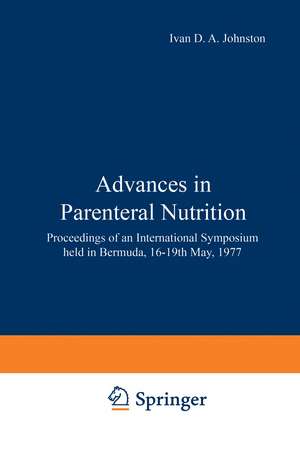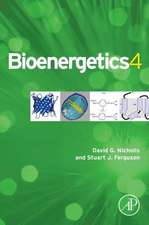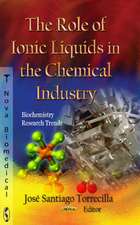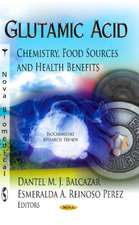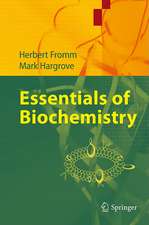Advances in Parenteral Nutrition: Proceedings of an International Symposium held in Bermuda, 16–19th May, 1977
Editat de I.D.A. Johnstonen Limba Engleză Paperback – 23 aug 2014
Preț: 732.36 lei
Preț vechi: 770.91 lei
-5% Nou
Puncte Express: 1099
Preț estimativ în valută:
140.16€ • 144.79$ • 116.64£
140.16€ • 144.79$ • 116.64£
Carte tipărită la comandă
Livrare economică 25 martie-08 aprilie
Preluare comenzi: 021 569.72.76
Specificații
ISBN-13: 9789401171908
ISBN-10: 9401171904
Pagini: 600
Ilustrații: XVI, 581 p. 68 illus.
Dimensiuni: 155 x 235 x 32 mm
Greutate: 0.83 kg
Ediția:Softcover reprint of the original 1st ed. 1978
Editura: SPRINGER NETHERLANDS
Colecția Springer
Locul publicării:Dordrecht, Netherlands
ISBN-10: 9401171904
Pagini: 600
Ilustrații: XVI, 581 p. 68 illus.
Dimensiuni: 155 x 235 x 32 mm
Greutate: 0.83 kg
Ediția:Softcover reprint of the original 1st ed. 1978
Editura: SPRINGER NETHERLANDS
Colecția Springer
Locul publicării:Dordrecht, Netherlands
Public țintă
ResearchCuprins
Section I Foundations of Parenteral Nutrition.- 1. Metabolic foundations of intravenous nutrition.- Section II Carbohydrates in Parenteral Nutrition.- 2. Some general considerations concerning the use of carbohydrates in parenteral nutrition.- 3. Metabolic pathways for carbohydrates in parenteral nutrition.- 4. Short-term parenteral nutrition with and without fructose.- 5. Evaluation of non-glucose carbohydrates in parenteral nutrition.- Panel Discussion.- Section III Amino Acids in Parenteral Nutrition.- 6. Intracellular amino acids and energy metabolism in catabolic patients with regard to muscle tissue.- 7. Biological limiting factors to parenteral amino acid feeding in man.- 8. Isotonic crystalline amino acids for protein sparing.- 9. The protein-sparing effect of isotonic amino acids: metabolic considerations.- Section IV Fat Emulsions in Parenteral Nutrition.- 10. Use of fat emulsions in parenteral nutrition.- 11. Lipid metabolism in stress.- 12. Role of lipid as a source of nonprotein calories.- 13. Effect of long-term administration of fat emulsion on lipid deposition in the reticuloendothelial system in man.- 14. Toxicity of lipids.- Section V Trace Elements in Parenteral Nutrition.- 15. Trace element formulations in intravenous feeding.- 16. Zinc and other trace elements.- Panel Discussion.- Section VI Parenteral Nutrition in Paediatrics.- 17. Aspects of intravenous feeding in childhood.- 18. Study of the use of total parenteral nutrition in neonates suffering from necrotizing enterocolitis.- 19. Use of Travasol in paediatric patients.- 20. Abnormalities of amino acid metabolism in the newborn.- Section VII Control of Infection in Parenteral Nutrition.- 21. Microbial hazards in the assembly of intravenous infusions.- 22. Bacterial contamination of intravenousinfusions due to faulty technique.- 23. The incidence of nosocomial infection in patients receiving total parenteral nutrition.- 24. Tracing sources of infection associated with parenteral infusions.- Section VIII Biochemical Aspects of Parenteral Nutrition.- 25. Acid-base balance during parenteral nutrition with Travasol.- 26. Metabolic complications of parenteral nutrition.- 27. The compatibility of extemporaneously added drug additives with Travasol (amino acid) injection.- Section IX Clinical Aspects of Parenteral Nutrition.- 28. Clinical experience of total parenteral nutrition.- 29. Protein sparing therapy during prolonged ileus.- 30. Cholestatic jaundice during parenteral alimentation in adults.- 31. The importance of parenteral nutrition as an adjunct to cancer treatment.- 32. Artificial nutrition and the gastrointestinal tract: some clinical and experimental data.- Section X Parenteral Nutrition and Body Composition: Assessment of Therapy.- 33. The tissue composition of surgical weight loss.- 34. Research in malnutrition and its application to parenteral feeding.- 35. The use of body composition measurements to assess the efficacy of parenteral nutrition.- 36. Use of 40K counting and its relationship to other estimates of lean body mass.- Appendix — SI units.
